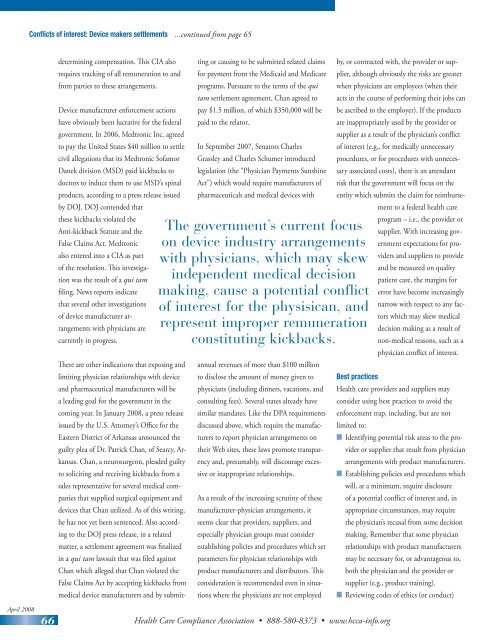HIPAA âminimum necessaryâ - Health Care Compliance Association
HIPAA âminimum necessaryâ - Health Care Compliance Association
HIPAA âminimum necessaryâ - Health Care Compliance Association
You also want an ePaper? Increase the reach of your titles
YUMPU automatically turns print PDFs into web optimized ePapers that Google loves.
Conflicts of interest: Device makers settlements ...continued from page 65determining compensation. This CIA alsorequires tracking of all remuneration to andfrom parties to these arrangements.Device manufacturer enforcement actionshave obviously been lucrative for the federalgovernment. In 2006, Medtronic Inc. agreedto pay the United States $40 million to settlecivil allegations that its Medtronic SofamorDanek division (MSD) paid kickbacks todoctors to induce them to use MSD’s spinalproducts, according to a press release issuedby DOJ. DOJ contended thatthese kickbacks violated theAnti-kickback Statute and theFalse Claims Act. Medtronicalso entered into a CIA as partof the resolution. This investigationwas the result of a qui tamfiling. News reports indicatethat several other investigationsof device manufacturer arrangementswith physicians arecurrently in progress.There are other indications that exposing andlimiting physician relationships with deviceand pharmaceutical manufacturers will bea leading goal for the government in thecoming year. In January 2008, a press releaseissued by the U.S. Attorney’s Office for theEastern District of Arkansas announced theguilty plea of Dr. Patrick Chan, of Searcy, Arkansas.Chan, a neurosurgeon, pleaded guiltyto soliciting and receiving kickbacks from asales representative for several medical companiesthat supplied surgical equipment anddevices that Chan utilized. As of this writing,he has not yet been sentenced. Also accordingto the DOJ press release, in a relatedmatter, a settlement agreement was finalizedin a qui tam lawsuit that was filed againstChan which alleged that Chan violated theFalse Claims Act by accepting kickbacks frommedical device manufacturers and by submittingor causing to be submitted related claimsfor payment from the Medicaid and Medicareprograms. Pursuant to the terms of the quitam settlement agreement, Chan agreed topay $1.5 million, of which $350,000 will bepaid to the relator.In September 2007, Senators CharlesGrassley and Charles Schumer introducedlegislation (the “Physician Payments SunshineAct”) which would require manufacturers ofpharmaceuticals and medical devices withThe government’s current focuson device industry arrangementswith physicians, which may skewindependent medical decisionmaking, cause a potential conflictof interest for the physisican, andrepresent improper remunerationconstituting kickbacks.annual revenues of more than $100 millionto disclose the amount of money given tophysicians (including dinners, vacations, andconsulting fees). Several states already havesimilar mandates. Like the DPA requirementsdiscussed above, which require the manufacturersto report physician arrangements ontheir Web sites, these laws promote transparencyand, presumably, will discourage excessiveor inappropriate relationships.As a result of the increasing scrutiny of thesemanufacturer-physician arrangements, itseems clear that providers, suppliers, andespecially physician groups must considerestablishing policies and procedures which setparameters for physician relationships withproduct manufacturers and distributors. Thisconsideration is recommended even in situationswhere the physicians are not employedby, or contracted with, the provider or supplier,although obviously the risks are greaterwhen physicians are employees (when theiracts in the course of performing their jobs canbe ascribed to the employer). If the productsare inappropriately used by the provider orsupplier as a result of the physician’s conflictof interest (e.g., for medically unnecessaryprocedures, or for procedures with unnecessaryassociated costs), there is an attendantrisk that the government will focus on theentity which submits the claim for reimbursementto a federal health careprogram – i.e., the provider orsupplier. With increasing governmentexpectations for providersand suppliers to provideand be measured on qualitypatient care, the margins forerror have become increasinglynarrow with respect to any factorswhich may skew medicaldecision making as a result ofnon-medical reasons, such as aphysician conflict of interest.Best practices<strong>Health</strong> care providers and suppliers mayconsider using best practices to avoid theenforcement trap, including, but are notlimited to:n Identifying potential risk areas to the provideror supplier that result from physicianarrangements with product manufacturers.n Establishing policies and procedures whichwill, at a minimum, require disclosureof a potential conflict of interest and, inappropriate circumstances, may requirethe physician’s recusal from some decisionmaking. Remember that some physicianrelationships with product manufacturersmay be necessary for, or advantageous to,both the physician and the provider orsupplier (e.g., product training).n Reviewing codes of ethics (or conduct)April 200866<strong>Health</strong> <strong>Care</strong> <strong>Compliance</strong> <strong>Association</strong> • 888-580-8373 • www.hcca-info.org
















